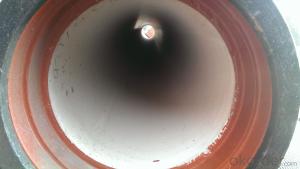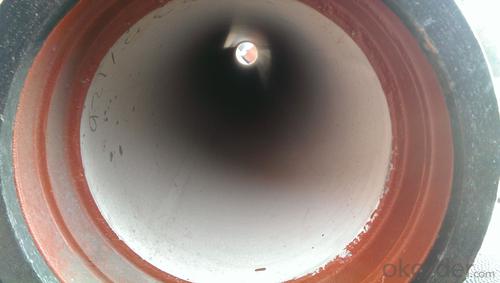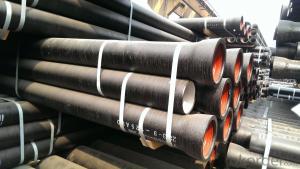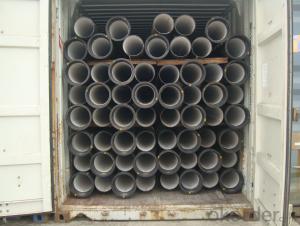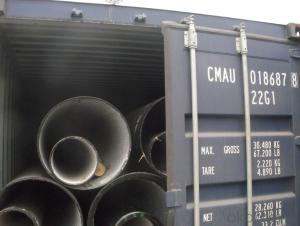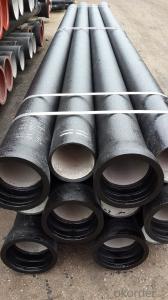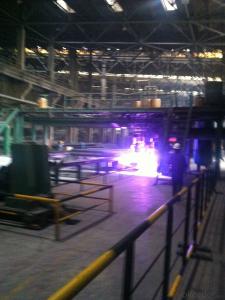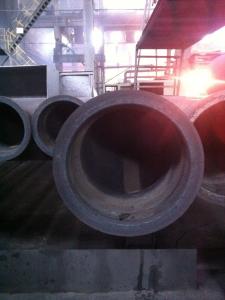DUCTILE IRON PIPES AND PIPE FITTINGS c25 DN900
- Loading Port:
- Tianjin
- Payment Terms:
- TT OR LC
- Min Order Qty:
- 25 m.t
- Supply Capability:
- 30000 m.t/month
OKorder Service Pledge
OKorder Financial Service
You Might Also Like
Material : Ductile Cast Iron
Size Range : DN 80mm to DN 2000mm
Unit Effective Length : 6m or 5.7m
Manufacture Standard: ISO 2531:1998/ EN 545:2006/EN 598:2007
Annual capacity : 200,000 tons
Coating Exterior: Zinc 130g/m2 according to ISO 8179-1 and bitumen coating 70 microns.
Cement Interior: Portland Cement/ High Alumina Cement/ Sulphate Resisting Cement Lining according to ISO 4179
Special requirements on external coating and internal lining can be applied
We also provide accessories such as SBR/EPDM rubber gaskets, lubricant paste, pipe caps, PE sleeves, etc.
Additional Parts:
Each pipe is strictly inspected according to related standard to ensure permanently high performance.
Easy Installation at site and service free for life
Long Service Lifespan
Quotation will arrive you within 24hours once we get your inquiry.
We guarantee offering you a competitive price.
A copy of original inspection reports of pipes will be offered after shipment.
Photos of loading process will be sent to the customer after shipment effect.
We will follow-up the delivery progress after shipment effect and update to the customer on weekly basis.
- Q: Are ductile iron pipes suitable for use in irrigation gate systems?
- Yes, ductile iron pipes are suitable for use in irrigation gate systems. Ductile iron is known for its durability, strength, and corrosion resistance, making it an ideal choice for applications requiring reliable and long-lasting piping systems like irrigation gate systems. Additionally, ductile iron pipes have excellent flow characteristics, allowing for efficient water distribution in irrigation systems.
- Q: Are ductile iron pipes suitable for pressure reducing valve stations?
- Yes, ductile iron pipes are suitable for pressure reducing valve stations. Ductile iron pipes have excellent strength and durability, making them capable of withstanding high pressure conditions. They also have good corrosion resistance, which is essential for long-term reliability in a pressure reducing valve station.
- Q: What are the typical pressure surge protection measures for ductile iron pipe?
- There are several typical pressure surge protection measures for ductile iron pipe that help ensure its integrity and longevity. These measures include: 1. Surge tanks: Surge tanks are commonly used to absorb pressure surges and minimize their impact on the ductile iron pipe. These tanks are typically installed at critical points in the pipeline system, such as at pump stations or near valves, to provide a reservoir for excess pressure. 2. Air release valves: Air release valves are essential components in ductile iron pipe systems that help release trapped air and prevent the formation of air pockets. These valves help maintain a stable pressure within the pipe and reduce the risk of pressure surges during operation or sudden changes in flow. 3. Pressure relief valves: Pressure relief valves are designed to protect ductile iron pipes by releasing excess pressure when it exceeds a predetermined threshold. These valves are typically installed at strategic locations in the pipeline system and are set to open when the pressure exceeds a safe limit, diverting the excess pressure to prevent damage to the pipe. 4. Surge suppressors: Surge suppressors are devices that are installed in ductile iron pipe systems to absorb and dissipate pressure surges. These devices act as shock absorbers, reducing the impact of pressure fluctuations and preventing damage to the pipe. Surge suppressors are particularly effective in situations where pressure surges are frequent or severe. 5. Pipe wall thickness: Another crucial measure for pressure surge protection in ductile iron pipe is ensuring an appropriate pipe wall thickness. By selecting a pipe with the correct wall thickness, engineers can ensure that the pipe can withstand the pressure surges it may encounter during operation. This helps prevent pipe failure or rupture due to excessive pressure. It is important to note that the specific pressure surge protection measures implemented for ductile iron pipe may vary depending on the specific application, pipe size, operating conditions, and regulatory requirements. Consulting with experts in pipeline engineering and design is crucial to determine the most suitable pressure surge protection measures for a particular ductile iron pipe system.
- Q: What is the manufacturing process of ductile iron pipes? Thank you
- Ductile iron pipe is a pipe dream of urban water supply, gas pipelines, sets of high strength, good ductility and corrosion resistance strong strength, has the essence of iron, steel, cast iron pipe and steel pipe is a traditional popular replacement products, is a kind of widely used pressure water supply, gas and send pipes. Has the advantages of high strength, good toughness, corrosion resistance and easy device and other excellent characteristics, is the traditional grey iron and steel pipe replacement products popular, has become the preferred data of water supply, gas industry, set high strength, good ductility and corrosion resistance strong strength, has the essence of iron, steel, is the traditional cast iron pipe and steel pipe replacement products under the popular small as you introduce the ductile iron pipe is how to make the.
- Q: What is the typical lifespan of ductile iron pipe?
- The typical lifespan of ductile iron pipe can vary depending on various factors such as the quality of the pipe, the conditions it is exposed to, and the maintenance practices employed. However, on average, ductile iron pipe has a lifespan of around 100 years. This is due to its inherent strength and durability, which allows it to withstand high pressure and various environmental conditions. Additionally, ductile iron pipe is often coated with protective materials such as cement mortar lining or polyethylene encasement, further enhancing its longevity. Regular inspections and maintenance can also help extend the lifespan of ductile iron pipe, ensuring that any issues or potential damages are identified and addressed promptly.
- Q: How do ductile iron pipes handle internal scale buildup?
- Ductile iron pipes possess exceptional resistance to the accumulation of internal scale, making them highly regarded. The material utilized in these pipes displays remarkable resistance to corrosion, effectively hindering the formation of scale deposits. Moreover, the pipes' sleek internal surface considerably reduces the likelihood of scale adherence. In the unlikely event that scale does commence its formation, ductile iron pipes handle it proficiently. The inherent robustness and durability of ductile iron enable it to withstand the pressure exerted by scale buildup. Consequently, the pipes can maintain efficient functionality, even in the presence of some internal scaling, thereby ensuring a dependable water flow. Nevertheless, it should be emphasized that regular maintenance and periodic cleaning remain imperative in order to prevent excessive accumulation of scale and ensure optimal pipe performance. This can be achieved through a variety of methods, including mechanical cleaning, chemical treatments, or high-pressure water jetting. By adhering to proper maintenance practices, the lifespan of ductile iron pipes can be prolonged, while minimizing any potential issues associated with internal scale buildup.
- Q: How does ductile iron pipe handle thermal expansion and contraction?
- Ductile iron pipe is able to handle thermal expansion and contraction effectively due to its inherent flexibility and strength. Its unique composition allows it to withstand the expansion and contraction caused by temperature fluctuations without breaking or becoming brittle. This property is crucial in preventing any damage to the pipe or its fittings, ensuring a reliable and durable pipeline system.
- Q: Can ductile iron pipe be recycled?
- Yes, ductile iron pipe can be recycled. It is a highly recyclable material that can be melted down and reused in the production of new ductile iron products. Recycling ductile iron pipe helps reduce waste and conserves natural resources.
- Q: What is the expected joint performance of ductile iron pipes?
- Ductile iron pipes are widely recognized for their outstanding joint performance. They possess exceptional durability and strength, making them suitable for a wide range of applications, including water distribution, sewer systems, and industrial pipelines. One crucial aspect of joint performance in ductile iron pipes is their ability to withstand external loads and pressure. To ensure minimal leakage and long-term structural integrity, the joints in these pipes are designed to create a tight and secure connection. This is accomplished through the utilization of various joint types, such as push-on joints, mechanical joints, and restrained joints. Push-on joints are commonly employed in ductile iron pipes due to their ease of installation. They do not require any specialized tools or equipment. These joints rely on a rubber gasket, which guarantees a watertight seal and prevents leakage. On the other hand, mechanical joints involve the use of mechanical devices, such as bolts and nuts, to establish a rigid connection between the pipes. This type of joint provides additional strength and resistance against external forces. Ductile iron pipes have undergone extensive testing to ensure their performance meets or exceeds industry standards for pressure and bending strength. They exhibit high resistance to corrosion, resulting in a longer service life. Additionally, they are less susceptible to damage caused by ground movements or vibrations. These properties contribute to the overall joint performance of ductile iron pipes, ensuring reliable and efficient operation in various infrastructure systems. When properly installed and maintained, ductile iron pipes display remarkable joint performance. They provide a reliable and durable solution for numerous applications within the water and wastewater industry.
- Q: What is the DN400 installation charge for ductile iron pipes?
- The wages paid under special circumstances: refers to the provisions of the state laws, regulations and policies, due to illness, injury, maternity leave, family planning leave, funeral leave, leave, leave, leave, regular shutdown, implementation of national or social obligations due to pay a certain percentage of wage hourly wage or salary when.
Send your message to us
DUCTILE IRON PIPES AND PIPE FITTINGS c25 DN900
- Loading Port:
- Tianjin
- Payment Terms:
- TT OR LC
- Min Order Qty:
- 25 m.t
- Supply Capability:
- 30000 m.t/month
OKorder Service Pledge
OKorder Financial Service
Similar products
Hot products
Hot Searches
Related keywords
